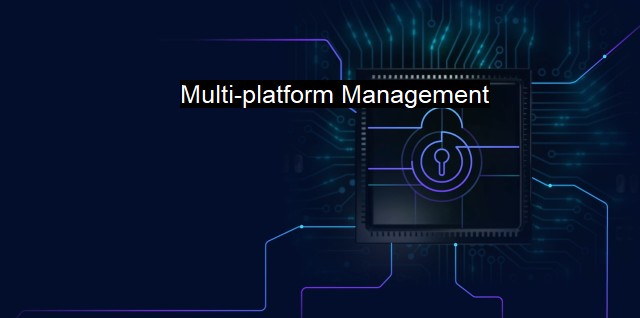What is Multi-platform Management?
Multi-Platform Management (MPM): Safeguarding Your Digital Presence Across Devices in an Increasingly Vulnerable Landscape
Multiplatform management is a strategy for safeguarding, optimizing, and controlling computing resources, applications, and data across a product line in which multiple types of endpoints (also referred to as platforms) are used. This includes a variety of devices, be it desktop computers, laptop computers, smartphones, tablets, or IoT devices, utilizing different types of platforms such as Linux, macOS, Windows, or Android.In the world of cyber security, multi-platform management is a tremendously crucial method. Cyber-attacks are a rapidly expanding issue, affecting businesses and individuals in every corner of the globe. It has become increasingly challenging to manage firewalls and antiviruses for different platforms at the same time. This is where multi-platform management steps in, providing ways to control wide range of platforms together, allowing for better inspection and mitigation of problems.
Antivirus and network security software often require different types for different platforms. Managing these types across all endpoints in an organization is a tall task. Without an effective cyber security strategy, each platform can end up being an entry point for cyber threats. A multi-platform management strategy prioritizes secure endpoint management and provides antivirus solutions that cover a wider range of platforms.
The goal is to reduce the efforts required for daily activities such as scanning for viruses, monitoring network traffic and updating software. It achieves this by automating these tasks across all platforms. The resultant simplification means administrators have more time to focus on more crucial areas of cyber security.
There are numerous benefits associated with the implementation of a multi-platform management strategy. With today's unprecedented data volumes, diversity of devices, and the constant threat of cyberattacks, this approach offers a solution for the efficient management and control over a disparate mass of devices and systems.
By integrating devices and platforms, the risk of security flaws resulting from ungoverned devices is significantly reduced. Having a holistic view of all platforms allows for much more effective detection of threats and, correspondingly, more rapid and appropriate responses. it transforms different elements of a network – all potentially susceptible points of attack – into a unified line of defense that’s far tougher to penetrate.
The automatic installation and consistent updating of the latest antivirus software also adds an additional layer of security. Regular software updates provide devices with the most recent defenses against the new threats that surface.
Numerous layers of defense are the key to effective cyber security, and multi-platform management offers this. Importantly, it also provides logging and reporting capabilities, all unified into a single, easily accessible interface. This allows an organization to analyze trends, detect patterns and confront threats in a proactive manner. Scrutiny of logs, trends, and incidents also increases the ability to conduct forensic investigations following a cyber attack, essential for an improved security strategy in the future.
Multi-platform management is an increasingly necessary function to ensure optimal cyber resilience. It coalesces antivirus solutions across different endpoints, improving visibility, and enhancing security across an entire organization. It reduces security gaps and improves response times, providing businesses with a more robust, cohesive line of defense. And with the escalation in the variety and intensity of cyber threats, the need for such an integrative and preventative cybersecurity measure is undoubtedly imperative. It provides not just a solution for current needs but also a foundation for future advancement in the face of continued fluctuations in the nature and scope of technological threats.

Multi-platform Management FAQs
What is multi-platform management in the context of cybersecurity and antivirus?
Multi-platform management in the context of cybersecurity and antivirus refers to the ability to manage security and antivirus measures across multiple operating systems and devices. This is important because not all devices run on the same operating system, and some organizations have a mix of devices that need protection.Why is multi-platform management important in cybersecurity and antivirus?
Multi-platform management is important in cybersecurity and antivirus because it allows organizations to have a centralized approach to managing their security measures. It saves time and resources as administrators do not have to manage each device individually. Additionally, it ensures that all devices are protected regardless of the operating system.What are some examples of multi-platform management cybersecurity solutions?
Some examples of multi-platform management cybersecurity solutions include Symantec Endpoint Protection, McAfee Endpoint Security, and Kaspersky Endpoint Security. These solutions provide a comprehensive approach to managing security across multiple operating systems and devices.What benefits do organizations get by adopting multi-platform management cybersecurity solutions?
Organizations that adopt multi-platform management cybersecurity solutions get several benefits. These benefits include improved security for all devices, greater efficiency in security management, and the ability to address security issues across all platforms at once. It also ensures compliance with regulatory requirements that mandate security measures across all platforms.| | A | | | B | | | C | | | D | | | E | | | F | | | G | | | H | | | I | | | J | | | K | | | L | | | M | |
| | N | | | O | | | P | | | Q | | | R | | | S | | | T | | | U | | | V | | | W | | | X | | | Y | | | Z | |
| | 1 | | | 2 | | | 3 | | | 4 | | | 7 | | | 8 | | |||||||